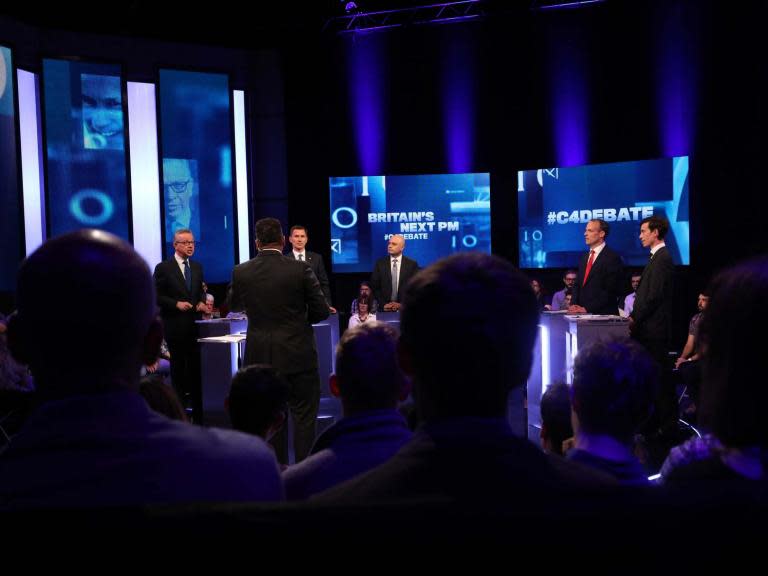Rory Stewart puts the other TV debate Tory challengers in the bin
“You’ve got to believe in the bin.” Rory Stewart stole the show with a chaotic anecdote about his wife telling him he wouldn’t be able to fit three bags of rubbish in the dustbin. He compared his rivals’ solutions to Brexit to asserting that if he simply believed it was possible to get all the rubbish in the bin, it would be possible.
The accident of alphabetical order put Stewart next to Dominic Raab, the most forceful advocate of using the threat of walking away from negotiations to force the EU to offer a better Brexit deal.
Raab made a reasonable point. “The minute we telegraph to the EU that we are not willing to walk away, we lose our negotiating leverage.”
But Stewart pointed out the flaw, which is that parliament is not prepared to let a prime minister “walk away” by taking the UK out of the EU without a deal. “A threat isn’t credible unless it can be delivered,” he said.
The studio audience even applauded Stewart when he said you can’t say to the EU that if it doesn’t give us what we want we will do something that is damaging to our economy. Stewart challenged Raab face to face, just inches away. “Let me ask you a couple of questions.”
“Do,” said Raab.
Stewart’s challenge was in fact to all the candidates – including Boris Johnson, whose empty lectern was addressed by several of them during the debate. How would they get us out of the EU when parliament refuses to vote for the deal and refuses to allow us to leave without a deal?
Raab’s response was essentially to trust him – “trust” was a word all the candidates used, but he used it most. In other words, “You’ve got to believe in the bin”. He said, “We don’t need to suspend parliament,” which implied he still might.
Michael Gove’s answer was to “change the backstop”. Why would the EU change its position for you when it wouldn’t for Theresa May, asked Krishnan Guru-Murthy, the presenter. Gove’s response was that he was the leader of the Leave campaign when his chances were “written off” by commentators like Guru-Murthy. Another version of “You’ve got to believe in the bin”.
Sajid Javid said “we”, meaning the government of which he is a prominent member, “haven’t prepared properly for no-deal for three years”. Once again, the bin. Even Jeremy Hunt, who said “I completely agree with Rory”, explained in reasonable-sounding language why he would get it done because he believed in the bin.
It was left to Stewart to sum up the problem with the phrase “no deal”. He said: “It means no to trade, no to a deal, no to detail.” He is right, but the problem with his message is that it comes close to saying that Brexit cannot be done. That may be too much honesty for the Conservative Party – let alone the country.
Stewart was the winner of the evening, but Hunt, Gove and Javid, the three with a realistic chance of facing Johnson in the final ballot of party members, did well enough – Hunt recovering after a dull start.
Hunt did well in the round about the candidates’ weaknesses, where most of them gave the standard job-interview answer about being too impatient (Gove, Raab) or too stubborn (Javid). Hunt, on the other hand, scored a point by defending Gove on taking cocaine (raised by Guru-Murthy), saying: “We should not be trivialising this important debate by talking about things people did 20 years ago.” Gove touched his arm to thank him.
And Hunt also voluntarily brought up his battle with the junior doctors, saying he had not communicated his case well, and praising their contribution to the NHS, which was risky.
(Stewart, naturally, gave an elegant self-effacing answer about his ignorance, and the need for listening rather than “great leader” macho posturing.)
The loser tonight ought to have been Boris Johnson, who would have performed well, in alphabetical order between Javid and Raab, and who was too fearful to take the risk.
But I fear that he got away with it.

 Yahoo News
Yahoo News 

